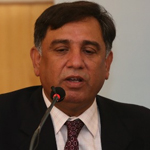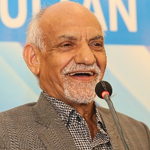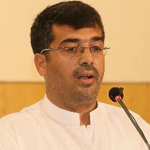 |
 |
 |
 |
 |
 |
International Conference
Sultan Bahoo & Mevlana Rumi
Second Session
Organized by
MUSLIM Institute and University of the Punjab, Lahore |
|
 |
Chair of the Session
Prof. Dr. Muhammad Ehsan Malik
Director, Sargodha University, Gujranwala Campus, Gujranwala
|
|
|
|
|
 |
Guest Speech - 1
Dr. Muhammad Iqbal Shahid
Chairperson Persian Department, Government College University, Lahore
|
MUSLIM Institute and University of the Punjab organized an International conference titled “Sultan Bahoo & Mevlana Rumi” on Thursday May 11, 2017 at University of the Punjab Lahore. Scholars, researchers and keynote personalities from Tajikistan, Iran, Bangladesh, and Afghanistan and from different universities of Pakistan participated and shared their views in the conference. Large no of People from different walks of life also participated in the second session of the conference. At the end of second session, conference shields were presented to all speakers.
Speakers expressing their views observed as under:
Character building of an individual and transforming him carry the notion of purifying him in accordance with the injunctions of the Holy Quran, where man is declared the vicegerent of Allah on earth. Human is formed of body and soul. Hence it is unison of pure and impure. The aim of mystics is spiritual purgation of a human, so he may be able to worship Almighty with absolute devotion. Mevalana Rumi (R.A) and Hadhrat Sultan Bahoo (R.A) are eminent Sufis. The former was the disciple of Shams Tabriz while the later was bestowed upon spiritually by the Holy Prophet Mohammad (S.A.W) and he was also the disciple of Qadri order. Both Sufis consider the vitality of true love, essential for ascension of human beings. Mevlana dispenses the teachings of purity and states that a devotee can enlighten his inner self through true love. A human should refine his soul. If a human is devoid of true love, he may become a manifestation of savagery instead of humanity. In the teachings of Hadhrat Sultan Bahoo, terms of “Laa” and “Hoo” are noteworthy. He designated “Kalma-e-Tayyibba” as the key of all spiritual treasures. “Laa” is the negation of everything except Almighty. A human cannot attain the level of humanity till he becomes pure. Adoption of “Laa” leads a human towards “Hoo”, the level that only renunciation of everything can escort a human being to the highest spiritual rank.
|
|
|
 |
Guest Speech - 2
Dr. Mohammad Mehdi Naseh
Professor, Ferdowsi University, Mashad, Iran
|
|
|
|
|
 |
Guest Speech - 3
Dr. Rashida Qazi
Dean - Faculty of Arts, Ghazi University, D.G Khan
|
Hadhrat Sultan Bahoo (R.A) is a known great Sufi saint as well as a man of great conviction and thought. In his childhood, there was a mesmerizing light on his face; if any non-Muslim looked at his face he would not stop himself reciting Kalima Tayyiba. In fact, he was a born Wali Allah (Friend of Allah). He spent 30 long years searching for a true spiritual mentor. He completely denies as well as discourages the notion of sectarian divide. He describes for himself that he was neither a Shia nor a Sunni. He always talks about the welfare and transformation of humanity through the love of God. This is the very reason that Sultan Bahoo’s work remains an ever green area of research for researchers. He emphasized over seeking of true love of Allah Almighty through Dhikr. Hadhrat Sultan Bahoo (R.A) wrote almost 140 books. Sympathy and love for humanity is stressed in all these books. Both the saints greatly emphasized the love and respect for humans as man’s heart is the abode of Almighty Allah. We need to follow their teachings and respect each other.
Mevlana Jalaluddin Rumi born in 604 Hijri during the reign of Seljuk Empire. This period is considered the renaissance of Persian language and literature. It was the era when poetry completed its journey from the court of a king to the shrine of a Sufi. The reign of Seljuk Empire, in its essence, was conducive to the dissemination of Sufi teachings. Eminent poets like Tahir Uryani, Abu Saeed, Abu Al-khair Neshapuri are well known for their expertise in four line poetry especially. These poets are the product of this reign. However, the greater contribution is laid down by “Masnavi” of Mevlana Rumi. The credit for the popularity of Masnavi goes to Mevlana Rumi. Mevlana Rumi received the title of Rumi only due to strong affiliation with Anatolia, and Anatolian peninsula for centuries had been called as Rum. His father was originally from Balgh but later on migrated to Konia. He was not only the expert of worldly affairs but also that of religious affairs. In the beginning, apparently, religio-politico knowledge seemed dominating his works. He was known an expert at oratory as well as at delivering “Fatwas” (a point of Islamic law given by a recognized authority).
|
|
 |
Guest Speech - 4
Dr. Shehla Saleem Noori
Chairperson Persian Department, Karachi University
|
|
|
|
|
 |
Guest Speech - 5
Dr. Sabahat Mushtaq
Urdu Department, International Islamic University, Islamabad
|
|
|
|
|
 |
Guest Speech - 6
Mr. Akbar Ali Sasoli
Lecturer Persian Department, University of Balochistan, Quetta
|
|
|
|
|
 |
Moderator
Dr Uzma Zareen Nazia
Assistant Professor, Persian Department, Punjab University
|
There is quite resemblance in teachings of Mevlana Rumi and Hadhrat Sultan Bahoo as about world (materialism), Mevlana Rumi says
"This world is the prison, and we are the prisoners: dig a hole in the prison and let yourself out!
What is this world? To be forgetful of God; it is not merchandise and silver and weighing-scales and women
If anyone abandons the world by his own (act of) renunciation, the world comes to him (with homage) more and more.”
Hadhrat Sultan Bahoo says
This word is unclean it can never be pure at all - Hoo,
Curse upon the life of the “Faqeer” (mystic) who keeps the world in his house - Hoo,
Love of the material world keeps away from the Lord; one should check this on time - Hoo,
To tell you the truth Bahoo, one should divorce this world forever – Hoo
Hadhrat Sultan Bahoo quotes an advice in his prose similar to the message of Mevlana Rumi that the lover of materialistic wealth always remains thirsty like a sick man and the world is like a poisonous river. When this thirsty man jumps into that poisonous river and drinks water from it, he dies. His thirst increases as long as he starts drinking water from it. His thirst is exactly like that of a dying man. The intensity of worldly thirst is even greater than the thirst on the day of judgement. That’s why; Sufis always forbade the love of material world. A Sufi always kept his heart wet with the water of Dhikarullah (contemplation). His primary objective is to quench the thirst of his followers who seek and aspire for the love of God. Moreover regarding knowledge, Mevlana Rumi says if knowledge is acquired for fulfilling the demands of material body only, then it becomes snake and if knowledge is acquired for the benefit of soul then it becomes friend. Hadhrat Sultan Bahoo says knowledge is the light of the right path without this light the ignorant Faqeer (mystic) loses the right direction.
Sufi literature is unique in essence only due to its peculiarity of regarding human being its primary subject matter. Transformation of an individual has been the prime objective of saints since ages. Their sole practice was to build a very strong relationship between man and his Creator. They disseminated the notion of consistency and reverence in the way of Almighty Allah. Only the love for God can enlighten love for humans. The very first principle for a seeker is to be consistent and humble while seeking for the will of God. Furthermore, they laid great stress over practicing spiritual and moral values in accordance with the injunctions of Quran and Sunnah. While looking into the contemporary state of affairs, we came to know that there prevailing wave of sectarian divide, extremism and terrorism. And Sufis have always been deeply concerned regarding these evils. They strongly condemned and vehemently worked for the establishment of peace and the survival of humanity.
|
|
|
Mevlana Rumi’s meeting with Shams Tabraiz proved turning point in his life. Shams Tabraiz completely changed his view point. There are multiple historical evidences regarding this particular incident. But the main point of consensus among historians is their agreement that Shams Tabraiz (R.A) was ordered by his father (also his spiritual mentor) to go and further hearten the already inspired soul of Mevlana Rumi (R.A). Over meeting Shams Tabraiz, Mevlana took huge inspiration from the wisdom of Shams Tabraiz. Even their followers started resenting upon the intensity of their involvement with Shams Tabraiz. While noticing the resentment, Shams Tabreez left Mevlana Rumi for an unknown place as well as for an unknown period of time. Absence of Shams Tabreez from the scene cast a spell over Mevlana Rumi. His thought process went through a drastic change in the wake of spiritual insight inculcated by Shams Tabraiz.
In the memory of his spiritual mentor, Mevlana Rumi used to dance in a typical style, known as Rumi style today. Their follower also used to join them while wearing a typical dress consisting long hat, narrow pant with long flapper shirt touching one’s knees. The contribution of Mevlana Rumi is universal. We cannot affiliate any attempt of religious sectarian divide with him. In the view of Allama Iqbal (R.A), he was a great Muslim scholar. His views were shadowed by Sufism. Sufism has always been considered a bridge between man and God. This belief is rich of the notion of oneness of God. In the absence of this belief, our “Ebadas” (worship) fall a prey to spiritual decline. Sufism inculcates the spirit of enlightenment in an individual. It grants an individual with the revival of spiritual insight. Thus embracing man with success in the way of Almighty Allah. History is evident that both notions Wahdat-ul-Wajud and Wahdat-ul-Shahood have been tested to attach with Mevlana Rumi. There is no denying the fact that he was the proponent of the same Ideology as that propagated by famous Muslim scholar Ibn e Arabi. For general public, it was difficult to grasp the Idea of Ibne Arabi’s teachings. Mevlana Rumi, with his effective command and mastery made it comprehendible and disseminated among general public.
|
|
|
 |
 |
 |
 |
 |
 |
|
|